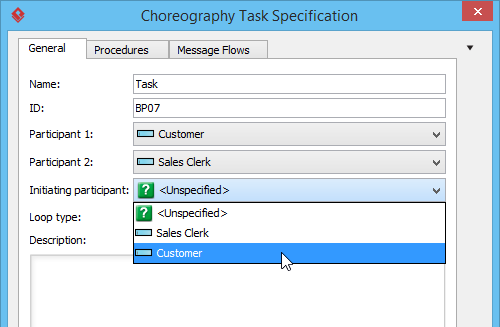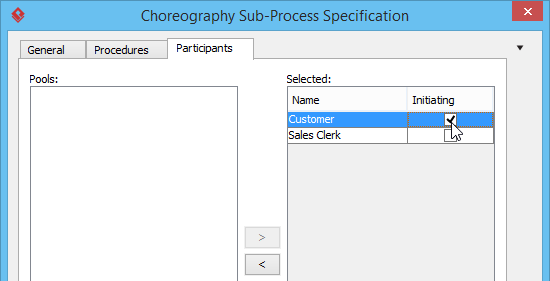BPMN choreography task and sub-process
Unlike a standard BPMN process which defines the flow of activities in a process, a choreography is a type of process which defines the sequence of interaction between participant. Choreography does not belong to any pool. It exist outside or in between pools and shows the messages that pass between pools.
Note that BPMN choreography task and sub-process were newly supported since BPMN 2.0.
Choreography task
A choreography task is an atomic activity which represents an interaction among participants (pools) and consists of one or more messages that exchange between the pools. A choreography shape is formed by multiple parts. We call them bands. The name of choreography task and each of the participants are all displayed in different bands.
Setting participants and initiating participant
- Right click on the choreography task in business process diagram and select Open Specification... from the popup menu.
- In the specification window, choose the pools for participant 1 and 2.
- Select the pool which starts the interaction from the drop down menu of Initiating participant.

Selecting initiating pool - Click OK to confirm editing and go back to diagram.

Choreography task
Choreography sub-process
A choreography sub-process is a compound activity in which it has detail that is defined as a flow of other activities.
Setting participants and initiating participant
- Right click on the choreography sub-process and select Open Specification... from the popup menu.
- In the specification window, open the Participants tab.
- Select the pools the choreography sub-process involve and click > to assign them.
- Check the initiating pool.

Select initiating participant - Click OK to confirm editing and go back to diagram.

Choreography sub-process
Related Resources
The following resources may help you to learn more about the topic discussed in this page.
| 6. Sequence and message flows | Table of Contents | 8. Data object |
